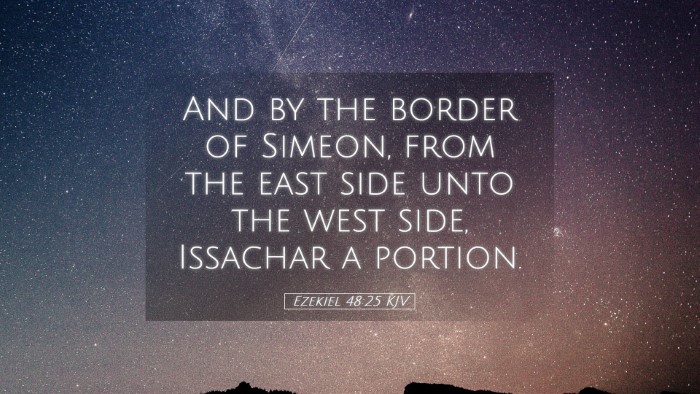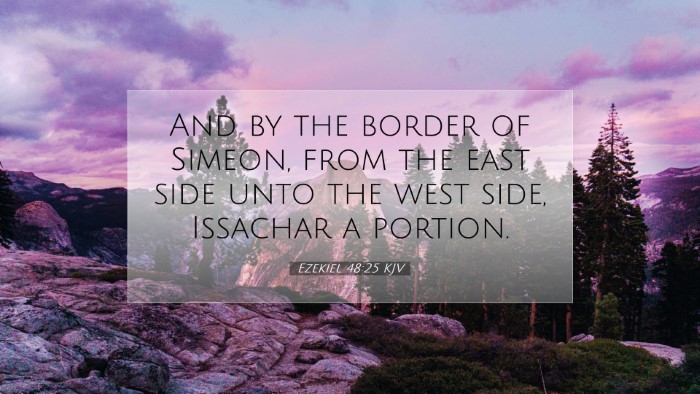Ezekiel 48:25 Commentary
Ezekiel 48:25 states: "And by the border of Simeon, from the east side unto the west, Benjamin shall have a portion." This verse forms part of the visionary and prophetic writings of Ezekiel, specifically regarding the division of the land among the tribes of Israel in the eschatological setting.
Contextual Overview
The closing chapters of Ezekiel focus on the restoration of Israel, showing a renewed hope for the people after their Babylonian exile. The division of land among the Twelve Tribes is crucial as it signifies the re-establishment of the nation and the fulfillment of covenant promises.
Exegesis and Interpretation
Commentators provide valuable insights into the implications of the land distribution. The placement of Benjamin between Judah and Simeon exhibits a strategic location, aligning with the prophetic significance associated with Benjamin.
Matthew Henry’s Commentary
Matthew Henry emphasizes the importance of the land distribution. He reflects on Benjamin's unique position, highlighting that it holds a "central" location within the territorial inheritance of Israel. This centrality is significant for several reasons:
- Symbolic Centrality: Benjamin's location symbolizes unity among the tribes, as it lies between Judah, the tribe of kings, and Ephraim.
- Historic Significance: The tribe of Benjamin is notably linked to Saul, the first king of Israel, and thus its position may carry royal and leadership implications for future governance.
- Spiritual Significance: The portioning takes place as part of God’s covenant promise, reflecting His faithfulness to His people despite their past transgressions.
Albert Barnes’ Notes
Albert Barnes provides additional insights on the geographical and theological implications. He notes:
- Geographical Allocation: Benjamin's territory was bound by significant landmarks, ensuring its distinct identity within the Promised Land.
- Theological Reflection: Barnes points to the notion that Benjamin represents the remnant of Israel, showcasing how God preserves and restores His people.
Adam Clarke’s Commentary
Adam Clarke adds depth by discussing the prophetic implications of the tribes' arrangements:
- Prophetic Guidelines: Clarke refers to the prophetic authority in the distribution of land, observing that this reflects divine order amidst chaos.
- Covenantal Reestablishment: He emphasizes the importance of this land division as part of God’s ongoing covenantal relationship with Israel, symbolizing hope for restoration and peace.
Pastoral and Theological Insights
This text invites reflection on several broader themes:
- God's Faithfulness: The attribution of land signifies God's unbreakable covenant with His people, echoing through the ages as a call for faithfulness among followers.
- Unity in Diversity: The diverse tribes coming together in the distribution reflect the broader unity of the body of Christ, each contributing their unique gifts for the good of the whole.
- Hope in Restoration: The prophetic vision fosters hope, reminding believers of the ultimate restoration promised through Christ, where all tribes and nations find their place.
Conclusion
The exegesis of Ezekiel 48:25 demonstrates not only the historical and geographical allocation but also highlights profound theological truths about God's plans for His people. The commentaries of Matthew Henry, Albert Barnes, and Adam Clarke collectively enrich our understanding of this passage, encouraging readers to meditate on God’s faithfulness and the significance of unity and restoration in the mission of the church today.


